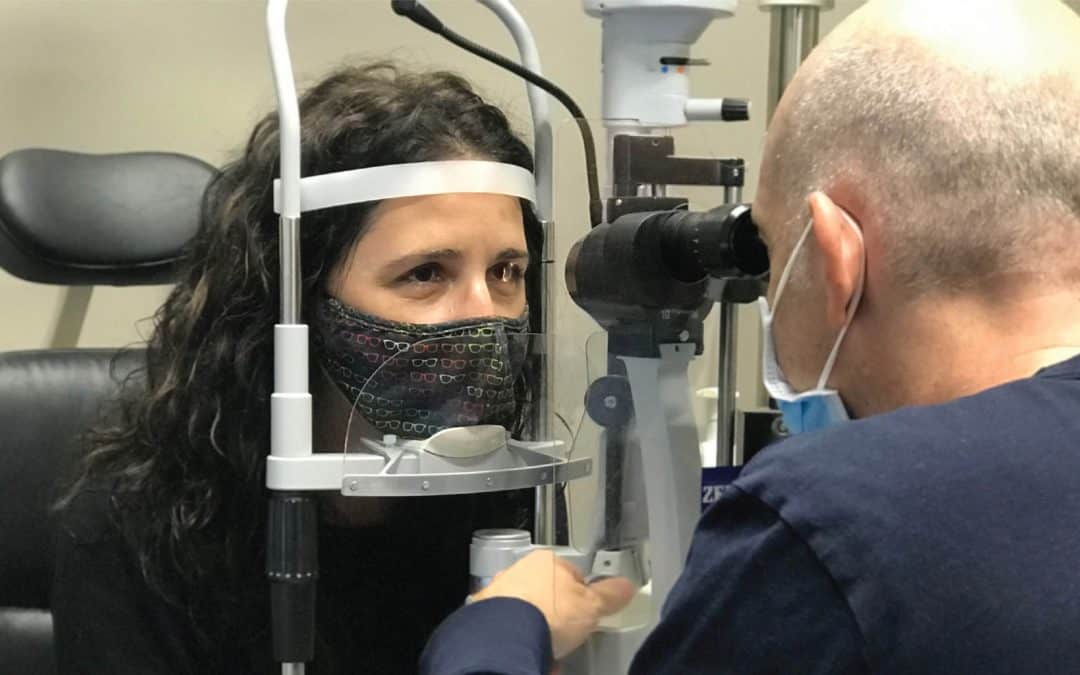As COVID-19 continues to dominate the headlines, protecting yourself and those around you is vital as is looking after your health including the health of your eyes.
Coronavirus is transmitted from person to person mainly through airborne “respiratory droplets” produced when an infected person coughs or sneezes, much like how the flu virus spreads. These droplets can easily enter your body through the mucous membranes on the face, such as your nose, mouth, and yes — your eyes.
It’s important to understand why you need to look after your eyes and what you can do to maintain healthy eyes and optimal vision.
Every 6 minutes someone is told they are going blind, but at least half of sight loss is avoidable. Your eyes don’t often present any symptoms or pain with some conditions so it’s easy to neglect your eyes and carry on as normal. That’s why it’s so important to have regular eye examinations and to visit your optometrist if you notice anything different in your vision. Loss of vision and eye disease can affect anyone, but some factors can put you at a higher risk, such as advanced age (+60) or pre-existing conditions such as diabetes or a family history of eye disease. If you fall into any of these categories it is even more important to look after your eyes and book an annual eye exam.
An eye examination doesn’t just check to see if you need corrective lenses. It also provides a health check for your eyes; using advanced diagnostic equipment, the optometrist will be able to spot early signs of eye conditions and other health issues.
Guard Your Eyes Against COVID-19
-
Avoid rubbing your eyes. Although we all engage in this very normal habit, try to fight the urge to touch your eyes.
-
Tears carry the virus. Touching tears or a surface where tears have fallen can spread coronavirus.
-
Disinfect surfaces. You can catch COVID-19 by touching an object or surface that has the virus on it, such as a doorknob, and then touching your eyes.
-
Pink eye, or conjunctivitis, refers to an inflammation of the membrane covering the front of the eyeball. Conjunctivitis is characterized by red, watery, and itchy eyes. Viral conjunctivitis is highly contagious and can be spread by coughing and sneezing. If you suspect you have pink eye, call your eye doctor as treatments can be prescribed.
-
Contact Lenses or Eyeglasses? Many people who wear contact lenses tend to touch their eyes more often and may be thinking about switching to eyeglasses for the time being to lower the threat of being infected with coronavirus. If you wear contacts, make sure to properly wash your hands prior to removing or inserting them. Daily wear contact lenses are considered to be safer and you may want to have a yearly supply to avoid running out should there be a need to quarantine and demand is higher than supply. Wearing glasses may provide an extra layer of protection, however, unlike specialized safety goggles, glasses are not considered a safe way to protect your eyes.
-
Regularly Disinfect Glasses. Some viruses such as coronavirus, can remain on hard surfaces from several hours to days. This can then be transmitted to the wearer’s fingers and face. People who wear reading glasses for presbyopia should be even more careful, because they continually take their glasses on and off throughout the day. Gently wash the lenses and frames with warm water and soap, and dry your eyeglasses using a microfiber cloth.
-
Stock up on Eye Medications or Vitamins. It’s a good idea to stock up on important medications, including eye drops, in order to get by in case you need to be quarantined or if supplies run short.
-
Digital Devices and Eyestrain. At times like this, people tend to use digital devices more than usual. Take note of tiredness, sore eyes, blurry vision, double vision or headaches, which are symptoms of computer vision syndrome. Speak to your optometrist about the benefits of a dedicated computer pair of glasses or a blue light filter for your lenses. Remember to take a break from your screen every 20 minutes and to change your focus to a far distance for at least 20 seconds.
-
Children and Digital Devices. During this time your children may be watching TV and using computers, tablets and smartphones more frequently and for more extended periods. Computer vision syndrome, mentioned above, can affect children as well. Try to limit your child’s screen time, get them to take a 10 to 15 minute break every hour, and stop all screen time at least 60 minutes before sleep.
-
Children and Outdoor Play. If possible, it’s actually good for visual development to spend 1-2 hours a day outside.
From all of us at LMC Optometry & Eye Care, we wish you good health!

